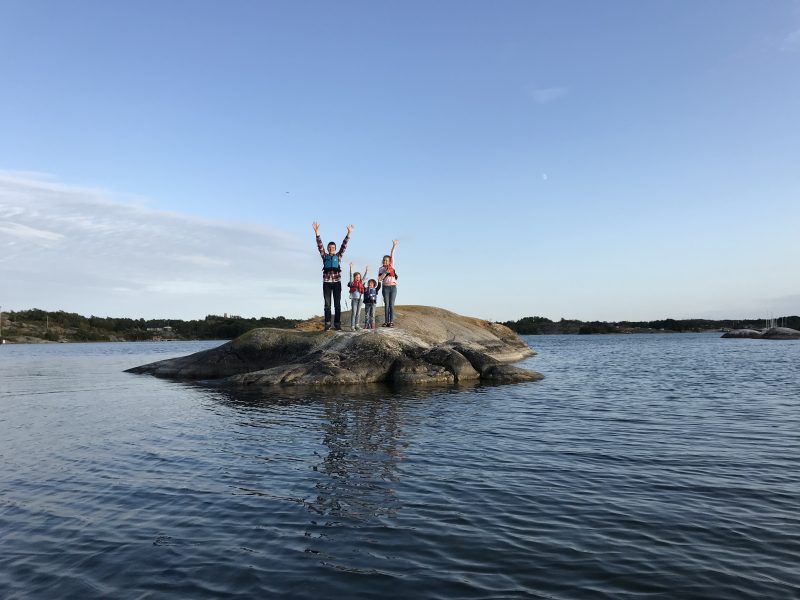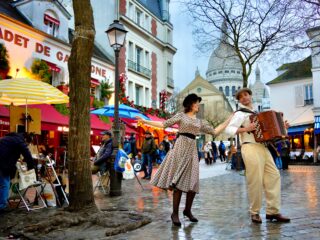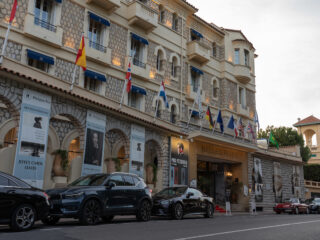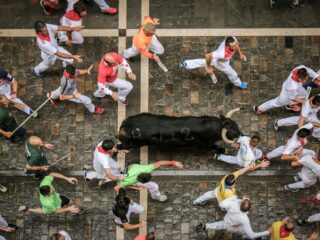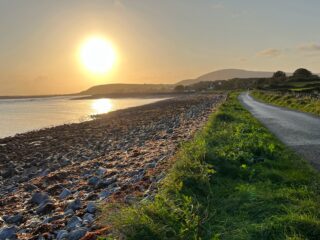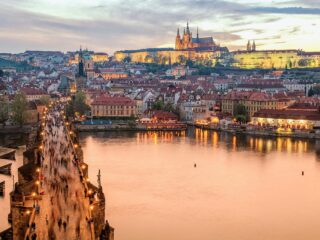By Maggie Hirt
Sailing is filled with high highs and low lows just like William Shakespeare’s comedies and tragedies. At different points of everyday, as in A Midsummer Night’s Dream, a sailor can feel “The lunatic, the lover, and the poet/ Are of imagination all compact” (V:1 7-8). The lunatic perhaps embodies all sailors as they endeavor out, the lover embodies the couples or teams that dare it, and the poet is those of us that try to communicate what is almost impossible to put into words—sailing.
In January 2019, my husband, Nick and I, with our four children, float in our 49 foot Westerly, Selkie, in Oban, Scotland. Even though it cost “a pound of flesh” (The Merchant of Venice IV:1 305), we decide to explore the Baltic with the world cruising club, aka the ARC. In the spring, we chart a course to sail north to the Shetlands, across to Norway, and finally around Denmark to Rostock, Germany. Every part of the journey is lovely as anticipated, until we have to circle Denmark. The water between Denmark and Norway, the Skagerrak, provides some of the most intense sailing I’ve seen in our three-year, live-aboard journey. Huge waves and strong winds direct us. Not given much of a choice, it blows 20-32 knots, and our heavy ship cruises with following seas twice what we are accustomed. Hamlet’s home and his famous words, “To be, or not to be” (III:1 56) arise. At one point, everyone below deck flies to the side when our ship Selkie catches an erratic, quartering wave. The sets are close together and an eye thrown backwards bulges with fear and hope, but the sun is high and the way to go is forward. When the darkness falls thick, the waves finally settled down. I take over at dawn through the Kattegat. More of Hamlet’s words softly echo in my head, “Whether ’tis nobler in the mind to suffer/ The slings and arrows of outrageous fortune/ Or to take arms against a sea of troubles/ And by opposing end them” (III:1 57-60). The risks we take as a family—is it worth it? Should we face the troubles the sea can possibly give to us, or should we stay in a house that hides the weather and world from our eyes? We sail on. The Baltic awaits.
After another overnight through brightly lit freighters, our family sails into Warnemünde, the port outside Rostock. We are quickly ushered forth to join the ARC fleet front and center in a huge med-mooring that is way too long. Our lines stretch to the limits. So… very tired. It’s a rocky morning to the ARC start. Later our children find a pirate childcare near the marina, but my eldest daughter, Lily, falls during a mock Olympic competition and breaks the top of her left arm. During all the get-to-know-you parties and dinners, we feel attacked by other cruisers for homeschooling our children. It takes conversation after conversation, over and over, to defend our way of life opposing questions and weary looks… Othello comes to mind—misled, confused, angry, experiencing prejudice. I feel accusations for something beautiful—I guess that makes me Desdemona. “O, beware, my lord, of jealousy!/ It is the green-eyed monster, which doth mock/ The meat it feeds on” (III:3 165-167).
Are they jealous because we are younger or with our children? Or do they have true concern? The next day, with my daughter’s arm in a sling, we sail toward the Baltic as a fleet. Selkie has a rough exit with its broken thrusters, and then we encounter huge waves and seasickness, but this leads to a new beginning. A few miles northeast, the weather settles down. We watch our fleet entering the Baltic with full sail. More Othello voices argue in my mind, “Tis neither here nor there,” (IV:3 58) right? Then… a quiet hopefulness. The sunrise smoothly paints watercolors before us with a gentle wind that fills our sails. The sea deepens, lengthens, and widens the water and fills Selkie’s lines, my hands, and the helm with history. On a cobalt blue sea, the water tension holds two worlds apart, yet perfectly works them together. This might just be good company.
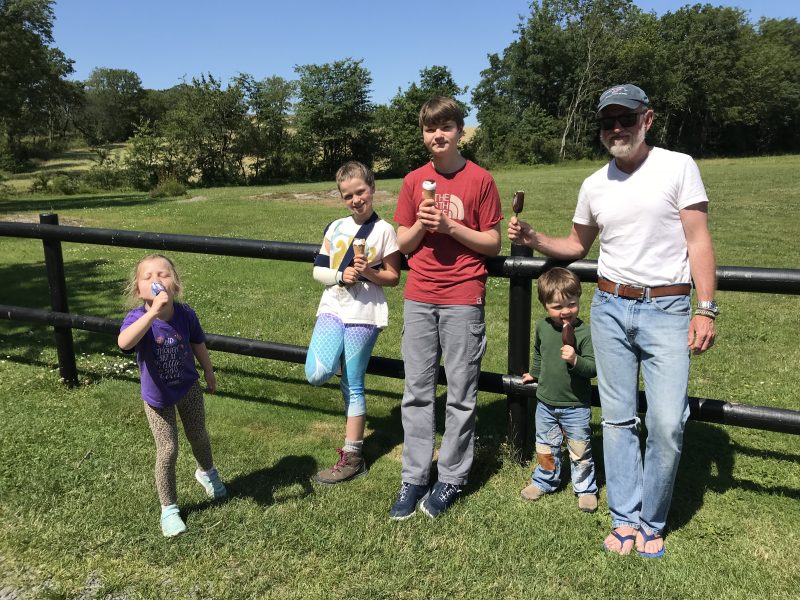
In Rønne, Bornholm, Denmark, the Baltic resembles a Midsummer Night’s Dream. Our boats have plenty of room, three thick, bow to stern on a wall. We enjoy our new company with no past qualms or animosity. All of us hoist flags and are happy getting to know each other from the bows and cockpits of our boats instead of formal dining halls. We share more discussions about education, and a form of respect grows for us and our life with live-aboard children. My youngest daughter, Mara, sports a shirt that states, “And though she be but little, she is fierce” (III:2 325) from Midsummer Night’s Dream, and Lily lives the quote with her bravery looking at a summer in an arm sling. We frolic about the quaint fishing villages eating ice cream, strolling through markets, visiting the history and castles—in love with our situation. Perhaps Bottom’s role as an ass from Midsummer Night’s Dream comes into play when Nick cuts his own leg with his own knife and needs five stitches. As his Queen Titania, I love him regardless. I would “kiss thy fair large ears, my gentle joy” (IV:1 4).
Next stop, Visby, Gotland, Sweden, which starts with an extremely windy raft up that requires collaboration—our boats hold hands. Lily and I venture out in the pouring rain. We stumble upon the medieval wall that surrounds the city, and we are immediately spellbound by the magic. With the fleet, we do a walking tour and have a potluck. Some museums are probed to learn more about Visby. We love watching young adults attend a music festival all around us. Loud music and saxophones play atop decks of yachts, DJs invoke dancing everywhere, and concertgoers relieve themselves in corners. The night is electric. We witness a cop show being filmed. “All the world’s a stage,/ And all the men and women merely players,” (II:7 138-139) from As You Like It is hard to ignore. We end the journey with a medieval restaurant that boasts atmosphere, costumes, lack of cutlery, torches, and mead next to cathedral ruins. We sneak out in the night like actors behind curtains towards the elusive Gotska Sandön.
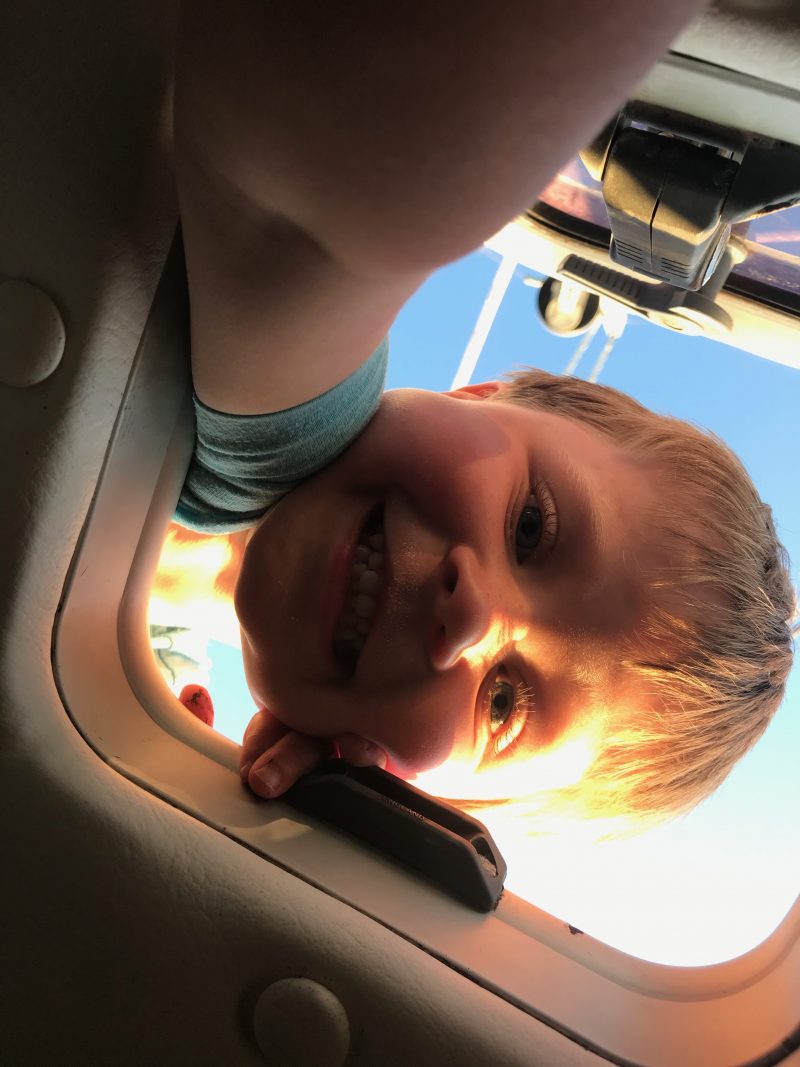
“Shall I compare thee to a summer’s day?/ Thou art more lovely and more temperate” (Sonnet 18: 1-2). We are only allowed to anchor if the weather is pristine, and Gotska Sandön, the small seal sanctuary island in the middle of the Baltic, is flawless. We set the anchor in the morning and spend the day on the beach. Our children play, we nap, and the sun sets deep into our souls. The water is clean, the Swedes naked, and the lighthouse museum a time capsule. We identify flowers on a hike and enjoy fizz aboard a friend’s boat. Summer is bright perfection here for two days.
On our way to Tallinn, Estonia, we feel The Tempest not in the weather, but in our engine. A slow death begins and Nick keeps replacing parts multiple times, until he runs out of options. “Now I would give a thousand furlongs of sea/ for an acre of barren ground” (I:1 63-64) With no wind, we bob for hours just outside the marina, until Mark (our Prospero), from the ARC team, convinces the police to pull us into a slip. We explore the city. The next day, Nick hires someone to fix the engine, so we will not be left behind, and we climb the Eppingi Tower. We get to try on medieval costumes and get cozy with a catapult. “Be not afeard: the isle is full of noises,/ Sounds and sweet airs that give delight and hurt not” (III:2 134-5). Quotes from The Tempest help us settle into the enchantment. We are immersed in history, but the night runs afoul. At an ARC dinner, I gag on the cold fish, and Nick has an allergic reaction to nuts.
The next day, we receive a reprieve when we visit the Seaplane Harbor Museum, one of the best museums we’ve seen. The true Caliban moment almost topples us when a customs officer notices that no other countries have stamped our passport to document our time in the Schengen zone. It is a debacle. They are upset and speak no English. After a search to document our travels, we find a slip receipt from Lerwick, Shetland, and Bergen, Norway. The distraught Caliban reluctantly backstamps our passports to Norway with our Prospero looking over his shoulder. The Estonians let five us leave. The engine is bandaged up and workable, so we set sail, for “We are such stuff/ As dreams are made on” (IV:1 156-7). Estonian moments are like waves in a tempest, but there will be no breaking of our staff or drowning of our book. A gentle wind fills our sails and pushes us onward toward Russia.
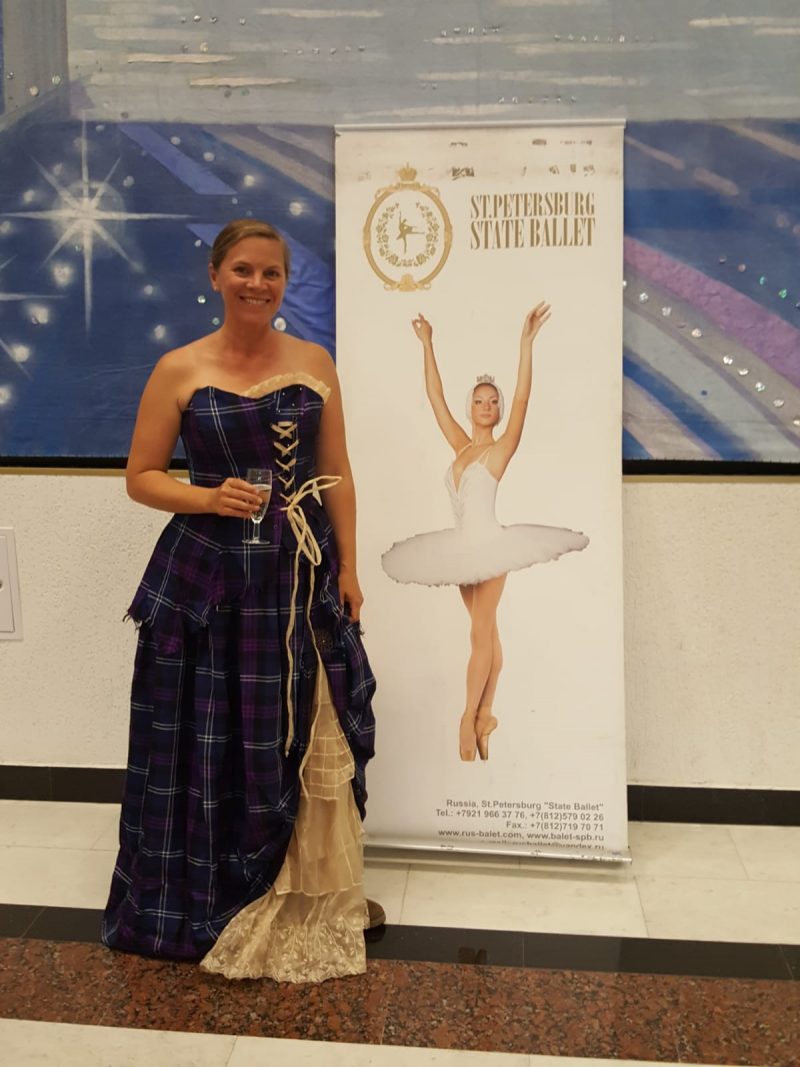
Excitement mounts in preparation for the visit to the highly reputed Saint Petersburg—the main draw for sailors to join ARC Baltic. As we approach, we see helicopters and submarines with many battleships. Ushered in slowly at the customs dock, there are interviews with search dogs. While waiting, we view the navy singing patriotic songs in full parade dress on the decks of their ships! “Some Cupid kills with arrows, some with traps” (III:1 106) from Much Ado About Nothing gets me thinking—What have we got ourselves into! We maneuver around the battle ships, the speeding hydrofoil transports, youth sailing lessons, and buzzing jet skis inside narrow channels to get to our pontoon! I hope the title of the play, Much Ado About Nothing doesn’t hold true. Ridiculously crowded, we tour the Hermitage, but the children are too tired. They prefer ice cream and Matryoshka dolls street side.
The next day, we visit Peterhof. Our kids play in trick fountains and get ice cream again as we run around the breathtaking lower gardens. To any who would ridicule us for so many ice cream retreats at these magnificent locations, I say “let me be that I/ am, and seek not to alter me” (I:3 32-33) from Much Ado About Nothing, because we are only as happy as our children. Inside we get ushered through crowded rooms, and I enjoy the stories of the female rulers. That night we see a folk show. We hoot and holler, buy a music toy, caviar, another Matryoshka doll, and vodka. Fireworks explode and fill the sky back at the marina. In the morning, we walk to the beautiful Church on Spilled Blood. We take a canal boat tour. It’s cold, but they hand out blankets and my youngest, Rory, naps on my lap. At the boat, we dress up fancy for the Russian ballet. It is wonderful, and in my Tartan formal dress, I feel “there was a star danced, and under that was I born” (II:1 317). Russia is not Much Ado About Nothing—it is invigorating. Next day, Nick and I see the Vodka and Chocolate Museum, eat Stroganoff, grab a navy chess set for my oldest, Tristan, and a woolen Moscow scarf for the girls. At night we talk with another ARC boat with homeschooled children. They agree that there is no better way to raise children—boat kids equal the best kids. We make ready to leave Russia. Checking out is as serious as checking in—dogs and guidelines. We are as happy to get out as we were to enter.
After a short wilderness stop at a remote island halfway to Helsinki, we learn Finland is sauna-central. If you eat, watch a movie, or do a chore, you are expected to sauna afterwards. Ashore in the city as a group, we join a walking tour. The guide points out historic buildings, leads us through markets, and notes the saunas. The city is beautiful, peaceful, and clean. We wander back to the marina to sauna. That night, Nick and I eat steaks and cheesecake and use electric scooters to zoom around. I can still feel my smile from that night. I fall asleep thinking, “Good night, good night! Parting is such sweet sorrow/ That I shall say good night till it be morrow” (II:2 185-186). I feel the pull of Juliet. Helsinki is so wonderful—it is my Romeo.
At the skipper’s meeting, “Double, double toil and trouble,/ Fire burn and cauldron bubble” (Macbeth IV:1 10-11), for the ARC warns us sufficiently of rocks and islands to come in the archipelago, but just like the witches predict Macbeth’s kingdom and downfall, so does the meeting predict our intimacy with an underwater rock. My mind screams, “Out, damned spot! Out, I say!” (V:1 35) like Lady Macbeth as our keel bounces up onto a boulder and stops us dead. For the archipelagos “look like th’ innocent flower,/ But be the serpent under’t” (I:5 64- 65). A motorboat happens along, grabs our halyard, pulls us sideways, and off we float. “Welcome to Finland!” he yells. Our pride wounded deeply, we motor a bit further to anchor and seven lick our wounds. Nick dives on the keel. There are only a few scratches. We keep an eye on the bilge. We are not sinking. Westerly built strong, reliable boats, and Selkie is part of that family. “What’s done cannot be undone. To bed, to bed, to bed” (V:1 67). Lady Macbeth beckons.
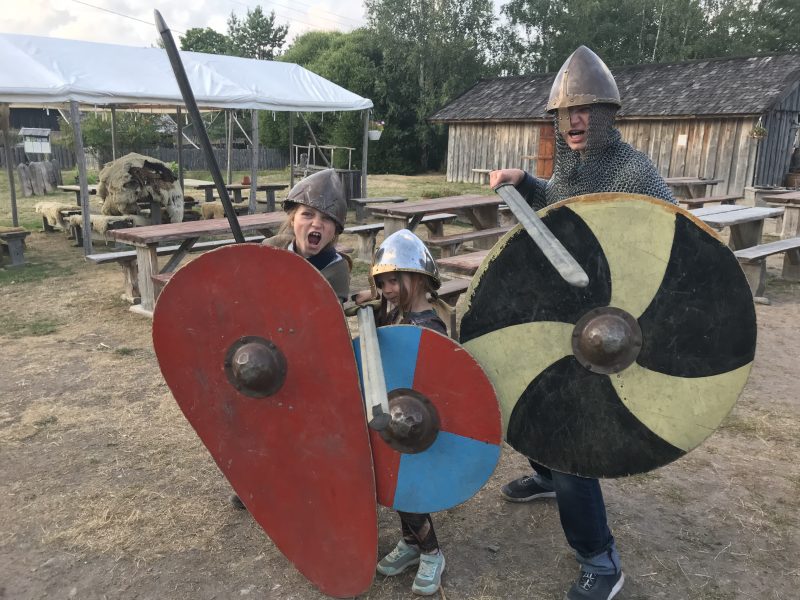
The sun did rise the next day. In a nice anchorage further along the coast, we anchor. The dinghy takes us to a dinner at the Viking Center at Rosala. Candles light a buffet in a longhouse with bunks that line the wall. On the grounds after dinner, there are costumes, weapons, a playground, a huge Viking ship, musical instruments, mazes, darts, axe-throwing, a catapult, bocce, horseshoes, fires, a smithy, a death boat, a wishing well, and yes… a sauna. And like the witches disappear in Macbeth, and his evil is slain in the end, a happy ending emerges from our encounter with the rock. We linger in amazement until sunset, and then with our flashlights, we find Selkie in the dark and sleep like slain Vikings, happy in Valhalla.
Further along, we stop at Sanvick, Kökar to anchor, hike, and have a dance party on the bow. Then onto Mariehamn, Åland, to meet up with the fleet. We squeeze in, find some groceries, and yes, a playground with ice cream. The town is quaint and teeming with families, shops, and parks. On the docks, the fleet holds a drink competition. My husband I enjoy sitting at the end of the dock thinking over the summer. We pull the lines and catch a perfect wind for a perfect sail. It’s nice to be out of the archipelago and sail without rock watching. The course is set for Sweden, and a quote from The Taming of the Shrew is evident, “Come, madam, wife, sit by my side/ and let the world slip: we shall ne’er be younger” (Ind.2 139-140). Hot tea warms my hands as my husband and I relax. Today this shrew has been tamed. I am in love with this man and our adventures.
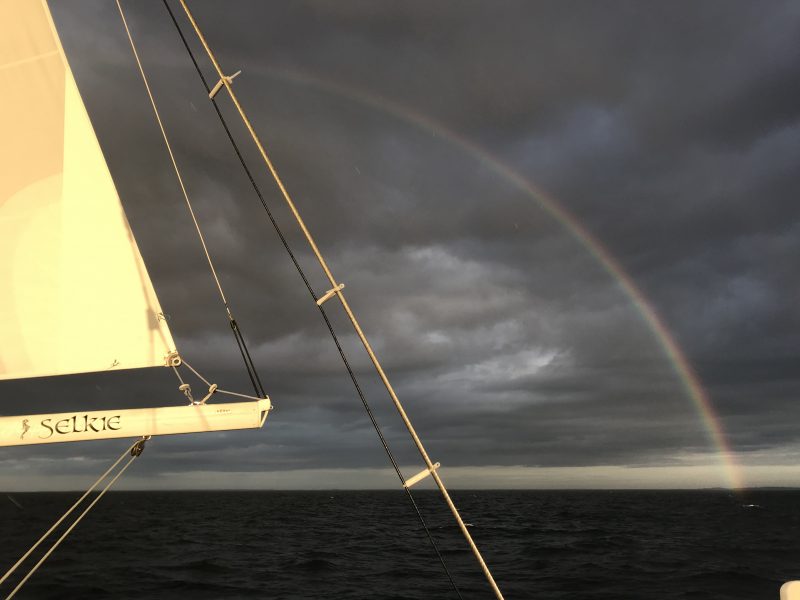
Finally, we make a turn and sail hard into Stockholm, Sweden. All day we are attentive to rocks again. We pass some nude divers and squeeze in with the fleet to a lazy line tie. I find a playground and more ice cream. At night, I talk education with the cruisers. Though they doubted us as capable homeschoolers at the beginning, we have won them over. I’m not the only shrew to be tamed. The ARC has melded us into a family. We will keep contact with a handful of these boaters for the rest of our lives.
This being our next to last stop, we have time to enjoy some sites. The children and I go to two unforgettable locations, and one of Shakespeare’s first play’s title comes to mind—The Comedy of Errors—as we learn about the Vasa, a Swedish warship that sank on its maiden voyage in 1628. Underwater, sheltered, and preserved with the Baltic’s salinity, it is breathtaking. Afterwards, with more ice cream, we cross to the Junibacken, which is a children’s museum based on Astrid Lindgren’s books. We travel inside pages on a Storybook train, which lifts up and flies through messy rooms and over villages—fun perfection.
We move south through five anchorages and marinas to experience Swedish small towns before we meet up one last time in Kalmar. It’s our last day as a group, so we tour the Kalmar Castle. Tristan makes me laugh with his knowledge of history, warfare, and castles. Rory gets a harmonica and blasts it loud on the castle walls. The playfulness of Twelfth Night comes to mind, “If music be the food of love, play on,/ Give me excess of it” (I:1 1-2). Underground, at the restaurant Källaren Kronan, the ARC projects photos from the summer. Rory wins the on-deck picture award. It is bittersweet, and Twelfth Night says to me, “If it be thus to dream, still let me sleep!” (IV:1 60). We grew so close that I tear up by the end of the night. It goes by too quickly; it was a single scene in a play that I wish to be never-ending.
But more adventures are planned, and my love for sailing, adventure, and Shakespeare will never change, so the sails fill with Juliet’s whispers in the wind, “My bounty is as boundless as 9 the sea,/ My love as deep; the more I give to thee,/ The more I have, for both are infinite” (II:2 133-135).
Maggie Hirt holds degrees from Hope College, Grand Valley State University and University of Toledo. Sailing the world’s oceans with her husband and four children, she is currently working on a Master of Letters from the University of the Highlands and Islands of Orkney for Scottish Highlands and Islands Literature. She is an award-winning writer, and a recent article in Cruising World magazine documents her family’s winter on Kerrera Island in Scotland. Her debut poetry chapbook, Levels of the Ocean, will be released March 18, 2022. Shortly after, her second chapbook, Layers of Blue, is set to be published. Maggie writes from her 49 foot Westerly sailboat, Selkie, during her early morning watch, and between boat school respites. The family plans a global circumnavigation. With pen, spatula and helm in hand, her sailing soul dances to the sea where she chooses words, academics, ingredients, and destinations. Follow their story at www.sealongingselkie.net.

